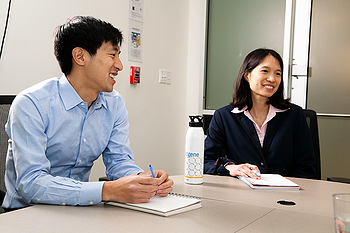This post was contributed by Theresa Liao of the University of British Columbia.
 When transitioning from an academic science career path to a non-academic one, one of the biggest changes (and perhaps challenges) is the need to present yourself using a resume. Indeed, instead of having all the pages in a Curricula Vitae to showcase your publications, academic performances, and research experiences, you now have merely two pages to convince your potential employer that you are the right candidate for the job.
When transitioning from an academic science career path to a non-academic one, one of the biggest changes (and perhaps challenges) is the need to present yourself using a resume. Indeed, instead of having all the pages in a Curricula Vitae to showcase your publications, academic performances, and research experiences, you now have merely two pages to convince your potential employer that you are the right candidate for the job.
How can you incorporate the skills developed during graduate school into your resume? How can you stand out among all the candidates applying for the position?
Here are a few things to consider when you're preparing your resume for a non-academic position:
What is a resume? How is it different from a CV?
Get familiar with the general format of a resume and the different presentation styles. Wikipedia does a good job summarizing what a resume should be about. With a CV, information is usually presented chronologically. With a resume however, most often people choose a reversed chronological style (the latest to the earliest) or a functional one. Pick one that makes sense for your skills, and the job you are applying for. Also remember that a resume is typically no more than 2 pages long.
Write your resume for the job posting
Don't think a resume is "one size fits all" like sometimes CVs are. Because you only have two pages, you need to have a good idea of what should be highlighted on your resume, and tailor the resume for the job posting. For example, if the job asks for experience in “statistical analysis”, mention “statistical analysis” (word by word) in your resume. If the job posting says “French-speaking is an asset,” mention “speaks French.” Employers usually don't spend more than 20-30 seconds on a resume when they first look at it. Don’t make them have to guess what you are capable of. You would be surprised to learn how often I see resumes from good candidates that I almost missed because I had to “dig” hard for the information.
Think "skills," not just "research and publications”
What are the skills you developed through your research? Don't simply write about the research you did. Emphasize the skills. If you studied astronomy or bioinformatics data, then the chance is that you have handled large data sets and are familiar with statistical analysis. If you have done fluorescent imaging, then you probably have experience using image analysis software. If you use computer programs to predict protein structures, then you might know a thing or two about computer modeling. Make sure to focus on these skills. The only exception is when the research topic you have done is closely related to the job you are applying for, in which case talk about your research, as an understanding of the topic will give you some advantage over other candidates.
Write about your transferable skills
Some of the skills you developed might not have come from the research itself, but from what was necessary in order for you to do your research. For example, did you help put together a grant application? Are you familiar with the publishing or patent application processes? How about facilitating a collaboration between research groups? Perhaps you had some supervisory experience working with undergraduate students? On top of that, perhaps you were involved in some extracurricular activities – did you volunteer to do science outreach and teach children about science? Or perhaps you have presented in some public lectures? These transferable skills could be meaningful for your potential employer. For example, my experience in science outreach and writing was how I got my current job as a Communications Coordinator.
Wondering how you can develop more transferable skills? See Developing Transferable Skills During Science Training and So You Think You have Skills.
Get Science Communication Practice with a Student Group Like Science in the News
Talk to your career services office
Most universities actually have career services offices. You might think only undergraduates use these services, but some of the general knowledge about preparing a good resume, writing a concise cover letter, and dealing with interviews, is actually universal. Some universities even have officers working specifically to assist graduate students in job searching.
Start your career planning early, start now
Don't wait until the day you defend to start thinking about your next step. Start thinking now. Start browsing job postings and look at the jobs you are interested in. Consider listing the skills you already have, and the skills you need and don't have yet for that dream job. Also, many universities make their job postings and salary expectations public, so start by looking at these university postings to give yourself a sense of what to expect.
If you are still debating whether to stay in academia or not, it is even more important to start early. Think about your plan for the next 5 years. Does an academic career work well with your life and career plan? This might be a tough question to ask now, but the earlier you ask yourself, the better prepared you are for your next step.
Here are some great resources to get your resume started now. Good luck!
- Resume 101 from University of British Columbia, Student Services - includes videos on general resume writing, as well as additional videos with emphasis for graduate student resumes
- UC Irvine Non Academic Job Search Handbook & Resumes
- Read Our Blog Post on Submitting a Resume That Gets Seen
Thank You to Our Guest Blogger!
 Theresa Liao (@theresaliao) is the Communications Coordinator for the Department of Physics & Astronomy, University of British Columbia. Originally on track for a research career, she transitioned into a communications role instead after she completed her MSc in Experimental Medicine. She is the Community Relations Director for Curiosity Collider (hyperlink https://curiositycollider.org/) , which she co-founded, and the Outreach Manager for Science Borealis (hyperlink http://scienceborealis.ca/)
Theresa Liao (@theresaliao) is the Communications Coordinator for the Department of Physics & Astronomy, University of British Columbia. Originally on track for a research career, she transitioned into a communications role instead after she completed her MSc in Experimental Medicine. She is the Community Relations Director for Curiosity Collider (hyperlink https://curiositycollider.org/) , which she co-founded, and the Outreach Manager for Science Borealis (hyperlink http://scienceborealis.ca/)
Topics: Science Careers, Applying for Jobs







Leave a Comment